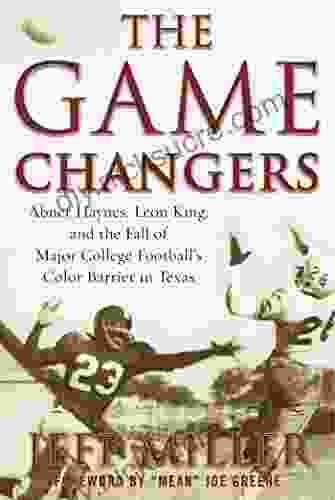Abner Haynes, Leon King, and the Fall of the Major College Football Color Barrier

In the annals of American sports history, few moments are as iconic as the breaking of the color barrier in Major League Baseball by Jackie Robinson in 1947. However, just a few years earlier, two African American football players had already shattered a similar barrier in the world of college football.
5 out of 5
| Language | : | English |
| File size | : | 2575 KB |
| Text-to-Speech | : | Enabled |
| Screen Reader | : | Supported |
| Enhanced typesetting | : | Enabled |
| Word Wise | : | Enabled |
| Print length | : | 267 pages |
| Lending | : | Enabled |
Abner Haynes and Leon King were both born in the early 1920s, Haynes in Dallas, Texas, and King in Shreveport, Louisiana. Haynes was a running back, while King was a lineman. Both players were standout athletes in high school, but their paths to college football were very different.
Haynes was recruited to play for the Arkansas Razorbacks, a major college football program in the Southwest Conference. However, when he arrived on campus in 1944, he was met with resistance from some of his teammates and coaches. Despite the opposition, Haynes persevered, and in 1947, he became the first African American to play in a major college football game.
King's path to college football was even more difficult. He was originally recruited to play for the TCU Horned Frogs, but he was forced to leave the team after just one season because of pressure from the university's administration. In 1947, he enrolled at Wiley College, a historically black college in Marshall, Texas. That same year, he became the first African American to play in a major college football game for a black college.
The breaking of the color barrier in major college football by Haynes and King was a major milestone in the civil rights movement. It paved the way for other African American athletes to play at the highest level of college football, and it helped to change attitudes about race in America.
Haynes and King both had successful college football careers. Haynes was a two-time All-American and led the Razorbacks to a Southwest Conference championship in 1947. King was a three-time All-American and led the Horned Frogs to a Cotton Bowl victory in 1950.
After college, Haynes and King both played in the National Football League. Haynes played for the Dallas Texans and the Chicago Cardinals, while King played for the Los Angeles Rams. Both players were inducted into the Pro Football Hall of Fame in 1995.
The breaking of the color barrier in major college football by Abner Haynes and Leon King was a watershed moment in the history of sports. It was a victory for civil rights and a testament to the courage and determination of two young men.
Abner Haynes
Abner Haynes was born in Dallas, Texas, on September 13, 1921. He was the youngest of seven children. His father was a minister, and his mother was a homemaker. Haynes grew up in a poor neighborhood, but he was a talented athlete. He played football, basketball, and track in high school, and he was a standout in all three sports.
Haynes was recruited to play football for the Arkansas Razorbacks by head coach John Barnhill. Barnhill was a progressive coach who believed that all players, regardless of race, should be given a chance to play. Haynes arrived on campus in 1944, and he quickly became one of the team's best players. He was a versatile player who could play running back, receiver, and defensive back.
In 1947, Haynes became the first African American to play in a major college football game. He played in the Razorbacks' season opener against Oklahoma A&M, and he rushed for 100 yards and scored two touchdowns. The Razorbacks went on to win the Southwest Conference championship that year, and Haynes was named an All-American.
Haynes continued to play for the Razorbacks until 1950. He was a two-time All-American, and he led the team to another Southwest Conference championship in 1948. After graduating from Arkansas, Haynes was drafted by the Dallas Texans of the National Football League. He played for the Texans for two seasons, and he was a Pro Bowl selection in both years.
In 1952, Haynes was traded to the Chicago Cardinals. He played for the Cardinals for four seasons, and he was a Pro Bowl selection in 1953. Haynes retired from the NFL after the 1955 season. He was inducted into the Pro Football Hall of Fame in 1995.
Leon King
Leon King was born in Shreveport, Louisiana, on June 23, 1924. He was the oldest of seven children. His father was a farmer, and his mother was a homemaker. King grew up in a poor neighborhood, but he was a talented athlete. He played football, basketball, and track in high school, and he was a standout in all three sports.
King was recruited to play football for the TCU Horned Frogs by head coach Dutch Meyer. Meyer was a conservative coach who was reluctant to recruit African American players. However, King was so talented that Meyer could not ignore him.
King played for the Horned Frogs for one season, in 1946. He was a starting lineman, and he helped the team to a 9-2 record. However, after the season, King was forced to leave the team because of pressure from the university's administration. The administration was afraid of the backlash that would come from having an African American player on the team.
In 1947, King enrolled at Wiley College, a historically black college in Marshall, Texas. He played for the Wiley Wildcats for two seasons, and he was a two-time All-American. In 1949, King led the Wildcats to a victory over the TCU Horned Frogs, the team that had forced him to leave a few years earlier.
After graduating from Wiley College, King was drafted by the Los Angeles Rams of the National Football League. He played for the Rams for five seasons, and he was a Pro Bowl selection in 1951. King retired from the NFL after the 1954 season. He was inducted into the Pro Football Hall of Fame in 1995.
The Legacy of Abner Haynes and Leon King
Abner Haynes and Leon King were pioneers who paved the way for other African American athletes to play at the highest level of college football. They faced discrimination and prejudice throughout their careers, but they never gave up on their dreams. Their courage and determination helped to change attitudes about race in America.
The legacy of Haynes and King is still felt today. They are an inspiration to young athletes of all races, and their story is a reminder of the power of sports to break down barriers and bring people together.
5 out of 5
| Language | : | English |
| File size | : | 2575 KB |
| Text-to-Speech | : | Enabled |
| Screen Reader | : | Supported |
| Enhanced typesetting | : | Enabled |
| Word Wise | : | Enabled |
| Print length | : | 267 pages |
| Lending | : | Enabled |
Do you want to contribute by writing guest posts on this blog?
Please contact us and send us a resume of previous articles that you have written.
 Fiction
Fiction Non Fiction
Non Fiction Romance
Romance Mystery
Mystery Thriller
Thriller SciFi
SciFi Fantasy
Fantasy Horror
Horror Biography
Biography Selfhelp
Selfhelp Business
Business History
History Classics
Classics Poetry
Poetry Childrens
Childrens Young Adult
Young Adult Educational
Educational Cooking
Cooking Travel
Travel Lifestyle
Lifestyle Spirituality
Spirituality Health
Health Fitness
Fitness Technology
Technology Science
Science Arts
Arts Crafts
Crafts DIY
DIY Gardening
Gardening Petcare
Petcare Hazel Holmes
Hazel Holmes Vitaly Pedchenko
Vitaly Pedchenko Mj Porter
Mj Porter Thomas C Tabor
Thomas C Tabor Nicole Conway
Nicole Conway Laura Pohl
Laura Pohl A L Graziadei
A L Graziadei Lauren Muhlheim
Lauren Muhlheim Robert P Harris
Robert P Harris A G Howard
A G Howard Hicham And Mohamed Ibnalkadi
Hicham And Mohamed Ibnalkadi Todd Gitlin
Todd Gitlin Francis Pryor
Francis Pryor Bree Moore
Bree Moore Stan Skinner
Stan Skinner Jon Gillespie Brown
Jon Gillespie Brown Paul Watzlawick
Paul Watzlawick Richard Heath
Richard Heath Ari Tuckman
Ari Tuckman Jane Austen
Jane Austen Michael D Coogan
Michael D Coogan Gabrielle Coleman
Gabrielle Coleman Emily Evans
Emily Evans Mandy Rivers
Mandy Rivers Chelsea Crockett
Chelsea Crockett Max Tegmark
Max Tegmark Tripp Bowden
Tripp Bowden Shanterra Mcbride
Shanterra Mcbride Soap2day Publication
Soap2day Publication David G Taylor
David G Taylor William Scott Wilson
William Scott Wilson Dawn Huebner
Dawn Huebner Kathlyn Gay
Kathlyn Gay Jonalu Johnstone
Jonalu Johnstone Dane Huckelbridge
Dane Huckelbridge Jim Vernes
Jim Vernes Jose M Forero Bautista
Jose M Forero Bautista Jennifer N Smith
Jennifer N Smith Harry Yoon
Harry Yoon Alison Cotter
Alison Cotter Matthieu Ricard
Matthieu Ricard Cath Smith
Cath Smith Charles Edward Chapel
Charles Edward Chapel Olivia Smith
Olivia Smith A G Cairns Smith
A G Cairns Smith Marc S Sabatine
Marc S Sabatine Lindsey Lapointe
Lindsey Lapointe Adrian Dater
Adrian Dater Peter Shelton
Peter Shelton Alyssa Padgett
Alyssa Padgett Dr Howard Rankin
Dr Howard Rankin Akash Kapur
Akash Kapur Eva Mauer
Eva Mauer A M Strickland
A M Strickland Okina Baba
Okina Baba Cailin O Connor
Cailin O Connor A J Mackenzie
A J Mackenzie Lilith Mclelland
Lilith Mclelland Cynthia Ulrich Tobias
Cynthia Ulrich Tobias Sonya Chappell
Sonya Chappell A J Carlisle
A J Carlisle Rosie Garthwaite
Rosie Garthwaite Calvin L Chou
Calvin L Chou Pintip Dunn
Pintip Dunn Corina Morariu
Corina Morariu Bear Heart
Bear Heart Cristian Salcescu
Cristian Salcescu Lou Zambello
Lou Zambello Ridge Magee
Ridge Magee David H Barlow
David H Barlow Jim Allen
Jim Allen John D Currid
John D Currid Crystal Cestari
Crystal Cestari The R A
The R A Cassandra Clare
Cassandra Clare Kelly Starrett
Kelly Starrett Watt Key
Watt Key Toni Natalie
Toni Natalie Dr Stephanie Bloodworth Psyd
Dr Stephanie Bloodworth Psyd Bryan Berg
Bryan Berg Thomas R Martin
Thomas R Martin Cyndi Kinney
Cyndi Kinney Ken Alder
Ken Alder Valerio Varesi
Valerio Varesi Adam Savage
Adam Savage Peter Rees
Peter Rees Rebecca A Moyes
Rebecca A Moyes Niall Ferguson
Niall Ferguson Shauna Lynn Panczyszyn
Shauna Lynn Panczyszyn Natalie Pompilio
Natalie Pompilio Sarah Jo Brown
Sarah Jo Brown Tsao Lin E Moy L Ac Msom
Tsao Lin E Moy L Ac Msom Mike Tidwell
Mike Tidwell Amanda Ostrander
Amanda Ostrander Diane Burke Fessler
Diane Burke Fessler Roxanne Martin
Roxanne Martin Marlynn Jayme Schotland
Marlynn Jayme Schotland William Monk
William Monk A J Angulo
A J Angulo Winston Starr
Winston Starr Thomas Hager
Thomas Hager Zen Faulkes
Zen Faulkes Remy Agee
Remy Agee Eric Blehm
Eric Blehm John Halligan
John Halligan Lyndall Clipstone
Lyndall Clipstone Dan Romanchik Kb6nu
Dan Romanchik Kb6nu Kevin Adams
Kevin Adams Michael Lanza
Michael Lanza David Magee
David Magee Sharie King
Sharie King William Bauer
William Bauer K A Riley
K A Riley Stan Tenen
Stan Tenen Rebecca Pelky
Rebecca Pelky Peter Goldenthal
Peter Goldenthal John Long
John Long Jan Morris
Jan Morris Sherrilyn Kenyon
Sherrilyn Kenyon David A Wells
David A Wells Raymond M Smullyan
Raymond M Smullyan Giordano Scalzo
Giordano Scalzo Abigail Burd Lcsw Pmh C
Abigail Burd Lcsw Pmh C William F Mann
William F Mann Kenn Bivins
Kenn Bivins Linh Phung
Linh Phung Manoush Zomorodi
Manoush Zomorodi Scientia Media Group
Scientia Media Group Leslie Stager
Leslie Stager Mia Kankimaki
Mia Kankimaki Diane Stresing
Diane Stresing Jm Mason
Jm Mason Daniel S Pierce
Daniel S Pierce Aaron Kleinmeyer
Aaron Kleinmeyer Michael Dell
Michael Dell Todd Wanerman
Todd Wanerman W Timothy Gallwey
W Timothy Gallwey Jamal Moustafaev
Jamal Moustafaev Rysa Walker
Rysa Walker Elisabeth Fassas
Elisabeth Fassas A L Knorr
A L Knorr A J Hamler
A J Hamler Leigh Newman
Leigh Newman A M Wilson
A M Wilson Ray Ordorica
Ray Ordorica A J Stewart
A J Stewart Jean Philippe Dionne
Jean Philippe Dionne Rens Bod
Rens Bod Arlin Smith
Arlin Smith Timothy J Gawne
Timothy J Gawne Patrick Meechan
Patrick Meechan Megan Vickers
Megan Vickers Michael Labossiere
Michael Labossiere A H Almaas
A H Almaas Katerina Griffith
Katerina Griffith Tanya Selvaratnam
Tanya Selvaratnam Catherine Stonehouse
Catherine Stonehouse Lillian Tibbles Phd
Lillian Tibbles Phd John L Parker Jr
John L Parker Jr Alex Karp
Alex Karp Judi Garman
Judi Garman Dale P Clemens
Dale P Clemens Brian Clegg
Brian Clegg Charles Szypszak
Charles Szypszak Andreas Quast
Andreas Quast Walter Dean Myers
Walter Dean Myers Helen Marot
Helen Marot Nancy Mckenzie
Nancy Mckenzie Dean R Johnson
Dean R Johnson Jonathan Mckee
Jonathan Mckee Garret Romaine
Garret Romaine Jennifer L Armentrout
Jennifer L Armentrout Linda Tuhiwai Smith
Linda Tuhiwai Smith Dr Kevin Leman
Dr Kevin Leman Raymonde Carroll
Raymonde Carroll Zen Lylah
Zen Lylah Dmv Test Bank
Dmv Test Bank Bruce Collier
Bruce Collier Paul Mccarthy
Paul Mccarthy Roger Zelazny
Roger Zelazny Susan Aud Sonders
Susan Aud Sonders Susan Striker
Susan Striker Rafe Esquith
Rafe Esquith Armin A Brott
Armin A Brott Caspar Craven
Caspar Craven Steve Angers
Steve Angers Peter Zheutlin
Peter Zheutlin Virginia Willis
Virginia Willis Jeff Kane
Jeff Kane A F Stewart
A F Stewart Len Fisher
Len Fisher Flo Perry
Flo Perry Bruce Lansky
Bruce Lansky Tammara Webber
Tammara Webber Lauren Oliver
Lauren Oliver Kenneth Cloke
Kenneth Cloke Nick Jackson
Nick Jackson Leandro Taub
Leandro Taub Gary Gruber
Gary Gruber Larit Levy
Larit Levy Blair Holden
Blair Holden David J Vanbergen Jr
David J Vanbergen Jr Barbara J Bain
Barbara J Bain Amos Yong
Amos Yong Sandra Swenson
Sandra Swenson Lou Tabory
Lou Tabory Peter Maas
Peter Maas Jonathan S Rose
Jonathan S Rose Iasha King
Iasha King Byron Pitts
Byron Pitts Randy Friedman
Randy Friedman Jamie Vardy
Jamie Vardy Peter Godfrey Smith
Peter Godfrey Smith Anji Andrews
Anji Andrews Frost Kay
Frost Kay Eugene Don
Eugene Don N J Enfield
N J Enfield Certsquad Professional Trainers
Certsquad Professional Trainers Sergey Kosarevsky
Sergey Kosarevsky Lilin Yang
Lilin Yang Jennifer Longmore
Jennifer Longmore David Deutsch
David Deutsch Kerri Hummingbird Sami
Kerri Hummingbird Sami Polly Moore
Polly Moore Josh Skeen
Josh Skeen Anthony J Onwuegbuzie
Anthony J Onwuegbuzie Yasu
Yasu Russell Sher
Russell Sher A Roger Ekirch
A Roger Ekirch Rebecca Black
Rebecca Black Jennie Finch
Jennie Finch Susan Cooper
Susan Cooper Dame Darcy
Dame Darcy Scott A Ostrow
Scott A Ostrow Monte Burke
Monte Burke John Almberg
John Almberg Katrina Abbott
Katrina Abbott Matthew J Friedman
Matthew J Friedman Louis Jacques Dorais
Louis Jacques Dorais Mike Branon
Mike Branon Joe Navarro
Joe Navarro Erin Watt
Erin Watt Raymond J Carroll
Raymond J Carroll Dave Lowry
Dave Lowry Joe Pepitone
Joe Pepitone Marcus Butler
Marcus Butler William C Oakes
William C Oakes Upton Sinclair
Upton Sinclair Val Emmich
Val Emmich Mark Obmascik
Mark Obmascik Grady Hendrix
Grady Hendrix Michelle Maccarthy
Michelle Maccarthy Fernanda Pirie
Fernanda Pirie Rekha Ramcharan
Rekha Ramcharan Din Daniels
Din Daniels Loretta Sponsler
Loretta Sponsler Rachael Allen
Rachael Allen Val Mcdermid
Val Mcdermid Christine Wheeler
Christine Wheeler Steve Hindman
Steve Hindman Catherine Rodgers
Catherine Rodgers Dan Limbaugh
Dan Limbaugh Michael Lardon
Michael Lardon Day Leitao
Day Leitao R A Mejia
R A Mejia David Spiegelhalter
David Spiegelhalter Tiara R Brown
Tiara R Brown Shenyang Guo
Shenyang Guo Glenn Patron
Glenn Patron Vernon Trafford
Vernon Trafford Susanne Foitzik
Susanne Foitzik Pardha S Pyla
Pardha S Pyla Ryan Gray
Ryan Gray Harrison Fluss
Harrison Fluss James Baldwin
James Baldwin Zander Brumbaugh
Zander Brumbaugh Ed Webster
Ed Webster Joseph Mctaggart
Joseph Mctaggart Eileen Tracy
Eileen Tracy Rick Telander
Rick Telander Bob Frye
Bob Frye Kenay Keira
Kenay Keira Sandra Niche
Sandra Niche Heather Anderson
Heather Anderson Ken Dryden
Ken Dryden Businessnews Publishing
Businessnews Publishing A J Messenger
A J Messenger A J Mackinnon
A J Mackinnon Gemma Milne
Gemma Milne Jonathan Eig
Jonathan Eig Russell Davis
Russell Davis David Remnick
David Remnick Boston T Party
Boston T Party Brad K Chambers
Brad K Chambers Todd Downs
Todd Downs Homeira Qaderi
Homeira Qaderi Tim Flanagan
Tim Flanagan Don Fink
Don Fink Mark Ryan
Mark Ryan Sadie Robertson Huff
Sadie Robertson Huff Christiane Kutik
Christiane Kutik Micha Gorelick
Micha Gorelick Jec Aristotle Ballou
Jec Aristotle Ballou Andrea Falk
Andrea Falk Tony Wright
Tony Wright King Solomon
King Solomon Dale Dougherty
Dale Dougherty John Brenkus
John Brenkus Lisa Pease
Lisa Pease Christopher Small
Christopher Small E S Wynn
E S Wynn Philip Golding
Philip Golding Dr Tricia Groff
Dr Tricia Groff Matilda Ramsay
Matilda Ramsay Mrjamvad
Mrjamvad Ray Bradbury
Ray Bradbury Francis Fukuyama
Francis Fukuyama Pete Ripmaster
Pete Ripmaster Lindsey Vonn
Lindsey Vonn Shelly Mazzanoble
Shelly Mazzanoble Jennifer Trainer Thompson
Jennifer Trainer Thompson William Ramsey
William Ramsey Meghan Leahy
Meghan Leahy Bob Trueman
Bob Trueman Sherine Hamdy
Sherine Hamdy Timothy C Urdan
Timothy C Urdan Helen Fitzgerald
Helen Fitzgerald A K Davidson
A K Davidson Mitch Landrieu
Mitch Landrieu Dirk F Moore
Dirk F Moore Chris Diamond
Chris Diamond Seth M Holmes
Seth M Holmes Eric Sevareid
Eric Sevareid Taha Sochi
Taha Sochi Joel David Hamkins
Joel David Hamkins Gordon Macquarrie
Gordon Macquarrie Helen Buckley
Helen Buckley Karla Helbert
Karla Helbert Stephen R Lawhead
Stephen R Lawhead Bruce Tremper
Bruce Tremper John L Messina
John L Messina Bill Jones
Bill Jones Bob Plager
Bob Plager Dr Alan Whitcomb
Dr Alan Whitcomb Helen E Johnson
Helen E Johnson Heather Gudenkauf
Heather Gudenkauf Freya Hoffmeister
Freya Hoffmeister Lucy Christopher
Lucy Christopher Philip Yarrow
Philip Yarrow Kenneth Cline
Kenneth Cline John Williams
John Williams Rina Kent
Rina Kent Georgia Varozza
Georgia Varozza Roy Richard Grinker
Roy Richard Grinker Anghel Leonard
Anghel Leonard Thomas Mcguane
Thomas Mcguane Todd Rose
Todd Rose Anne Deans
Anne Deans Oba Ilari Aladokun
Oba Ilari Aladokun A R Vasishtha
A R Vasishtha Marks Prep
Marks Prep Saxton Pope
Saxton Pope Joshua Akin
Joshua Akin Andrew Henderson
Andrew Henderson Sean Skahan
Sean Skahan Filippo Coarelli
Filippo Coarelli Sarah Sutton
Sarah Sutton Matt Brown
Matt Brown John Mordechai Gottman
John Mordechai Gottman Alexander Greenmaj
Alexander Greenmaj Kathy Koch
Kathy Koch Chris I Naylor
Chris I Naylor Sam Warburton
Sam Warburton Ilya Ru
Ilya Ru Alf Wilkinson
Alf Wilkinson Lisa Murphy
Lisa Murphy Ken Castor
Ken CastorA G
 William Minto
William Minto Jack Grimshaw
Jack Grimshaw Charles Butler
Charles Butler Cathy A Malchiodi
Cathy A Malchiodi Karl Knopf
Karl Knopf Eric Armstrong
Eric Armstrong Jordan B Peterson
Jordan B Peterson Sky Marsen
Sky Marsen Tom Jordan
Tom Jordan Anne Sigismund Huff
Anne Sigismund Huff Steven Raichlen
Steven Raichlen Chuck Whelon
Chuck Whelon Barry Werth
Barry Werth Lyla Lee
Lyla Lee Anna Goldsworthy
Anna Goldsworthy George Francis Dow
George Francis Dow Carrie Harper
Carrie Harper Noah Gift
Noah Gift Jennifer Senior
Jennifer Senior Peter Nichols
Peter Nichols Angela Himsel
Angela Himsel Michael Shingleton
Michael Shingleton
Light bulbAdvertise smarter! Our strategic ad space ensures maximum exposure. Reserve your spot today!

 Gene SimmonsEssential Principles of Business for CSEC 4th Edition: A Comprehensive Guide...
Gene SimmonsEssential Principles of Business for CSEC 4th Edition: A Comprehensive Guide... Simon MitchellFollow ·15.1k
Simon MitchellFollow ·15.1k Phil FosterFollow ·8.1k
Phil FosterFollow ·8.1k Don ColemanFollow ·11.9k
Don ColemanFollow ·11.9k Peter CarterFollow ·9.8k
Peter CarterFollow ·9.8k Drew BellFollow ·19.6k
Drew BellFollow ·19.6k Keith CoxFollow ·17.3k
Keith CoxFollow ·17.3k George R.R. MartinFollow ·6.8k
George R.R. MartinFollow ·6.8k Arthur Conan DoyleFollow ·5.9k
Arthur Conan DoyleFollow ·5.9k

 Franklin Bell
Franklin BellHow Genesis Preserves Science Of Consciousness In...
The book of Genesis is...

 Ted Simmons
Ted SimmonsAt Day's Close, Night in Times Past
As the sun dips...

 Kenneth Parker
Kenneth ParkerRose Under Fire: Code Name Verity - A Heartbreaking and...
In the annals of...

 Jerry Hayes
Jerry HayesNurturing Massage for Pregnancy: A Comprehensive Guide to...
Pregnancy is...

 Blake Bell
Blake BellFill in the Blank: Word Kind of Animal Farm for Kids and...
This interactive fill-in-the-blank...
5 out of 5
| Language | : | English |
| File size | : | 2575 KB |
| Text-to-Speech | : | Enabled |
| Screen Reader | : | Supported |
| Enhanced typesetting | : | Enabled |
| Word Wise | : | Enabled |
| Print length | : | 267 pages |
| Lending | : | Enabled |












